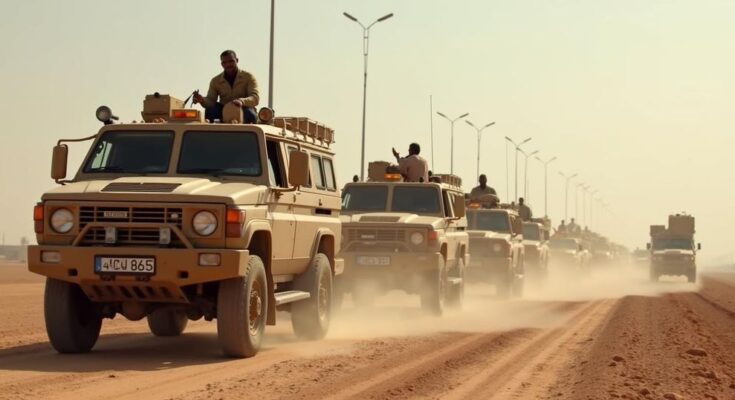Egypt is increasing its military operations in Somalia in preparation for the withdrawal of Ethiopian troops by December 31. This military buildup includes training Somali forces and sending arms as part of a strategic agreement made in August. The dynamics have been affected by tensions over the Grand Ethiopian Renaissance Dam and Ethiopia’s military presence in Somalia, with both Egypt and Ethiopia exchanging criticisms.
Egypt is intensifying its military presence in Somalia ahead of the December 31 deadline for Ethiopian troops to withdraw from the region. According to sources reported by The National, Cairo is actively training and equipping Somali security forces for operations against Al Qaeda-linked militant groups. This effort follows a significant military cooperation agreement between Egypt and Somalia that was signed in August, which has facilitated the transfer of arms, military advisors, and counter-terrorism specialists to Mogadishu. It is anticipated that by the end of the year, thousands of Egyptian military personnel will be engaged in these operations. Current estimates indicate that there are approximately 22,000 Ethiopian troops stationed in Somalia, acting under a bilateral agreement and as part of an African Union peacekeeping force aimed at combating Al Shabab. Tensions between Egypt and Ethiopia have been exacerbated by complaints from Cairo regarding an Ethiopian dam that threatens to diminish Egypt’s water supply from the Nile River. Similarly, Somalia has expressed concerns regarding its sovereignty following Ethiopia’s agreement with the region of Somaliland, which allows for Ethiopian access to a port on the Red Sea. In an interesting development, some Somali forces aligned with Egypt have already been deployed along supply routes used by Ethiopian troops, with the intent of preventing any further troop movements from Addis Ababa prior to the withdrawal deadline. The Ethiopian government has expressed alarm over Egypt’s military actions in the region and has reportedly increased its troop presence in response. Ethiopian officials have vocalized concerns that arms supplied by “external forces” could exacerbate the ongoing security challenges in Somalia. In contrast, Somalia’s Foreign Minister rebutted these claims, stating that Ethiopia’s remarks are an attempt to deflect attention from its own issues regarding illegal arms smuggling across its borders. Amidst these tensions, discussions persist regarding the Grand Ethiopian Renaissance Dam, a project vital to Ethiopia’s development but viewed with suspicion by both Egypt and Sudan. In light of these developments, Egyptian President Abdel Fattah El Sisi has emphasized the critical nature of the Nile River to Egypt’s survival and has encouraged regional cooperation in addressing grievances related to the dam. His recent summit with leaders from Somalia and Eritrea underscores Egypt’s commitment to bolstering its alliances in the Horn of Africa, as it confronts ongoing conflicts with Ethiopia.
The situation surrounds a complex geopolitical landscape in the Horn of Africa, specifically involving Egypt, Somalia, and Ethiopia. In recent years, tensions have escalated due to Ethiopia’s construction of the Grand Ethiopian Renaissance Dam (GERD), which Cairo fears will significantly reduce its share of the Nile’s water. Concurrently, Ethiopia has a considerable military presence in Somalia, which has been criticized by both Egyptian and Somali officials. The region continues to face security threats from militant groups such as Al Shabab, necessitating military cooperation between Egypt and Somalia. This growing military partnership aims to bolster Somali forces amidst external pressures and internal instability.
In conclusion, Egypt is strategically expanding its military involvement in Somalia as part of a broader regional effort to counter Ethiopian influence and enhance security against militant threats. The impending withdrawal of Ethiopian troops serves as a catalyst for this buildup, further complicated by ongoing disputes over water rights and geopolitical alliances in the Horn of Africa. As these nations navigate their relationships, local and regional stability remains at stake, underscoring the need for continued diplomatic efforts.
Original Source: www.thenationalnews.com




